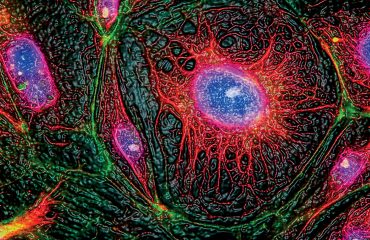The winner of the midterm elections: Science
Though ballots are still being counted in almost a dozen states, there was one clear winner from Tuesday’s elections: Science. Seven first-time members of congress have engineering, math, technology or medical backgrounds, and another six kept their seats in hotly contested races.
Arguably, scientific knowledge has never been more important to the efficacy of our legislature. From the terrible fires in California to the manipulation of fetal DNA, from Net Neutrality to the Anti-vaxxers, a grasp of the complexities of STEM (science, technology, engineering & mathematics) are increasingly crucial to making laws that harness the powers of science in a positive way.
Access to this kind of specialized knowledge has been less automatic for Congressmen and women of late. In 1972 the Office of Technology Assessment was created to “provide Congressional members and committees with objective and authoritative analysis of the complex scientific and technical issues of the late 20th century.” From 1972 to1995 the office released over 750 studies on an impressive range of topics, including the environment (acid rain, climate change, and resource use), national security (technology transfer to China and bioterrorism), health (disease and medical-waste management), and social issues (workplace automation and how technology affects certain social groups).
In 1995 the office was defunded and shuttered and Congress has essentially been on its own since then in terms of seeking out scientific expertise, with mixed results. In 2016 Shaughnessy Naughton – a chemist who twice ran for the 8th congressional district of Pennsylvania – formed a bi-partisan political action committee called 314 Action to help STEM-trained professionals successfully run for congress. In only two years, they already seem to have had an impact.
Of the candidates they endorsed and helped, seven were elected to house seats, and one to the Senate. In January these new congressmen and women will join seven 314 Action supported ‘trailblazers’ who were elected to congress in 2016.
Among the new winners:
- Elaine Luria, an engineer and career naval officer who will represent Virginia’s military-heavy Hampton Roads district as a Democrat
- Chrissy Houlahan, who has a bachelor’s degree in industrial engineering from Stanford and a master’s degree in technology policy from the Massachusetts Institute of Technology (MIT) and who will represent Pennsylvania as a Democrat.
- Lauren Underwood, a registered nurse and former Health and Human Services Department adviser under the Obama administration who will represent Illinois as a Democrat.
- Pediatrician Kim Schrier of Washington state, whose passion is healthcare and who herself has type 1 diabetes.
- Sean Casten, an energy industry executive with an interest in renewable energy, who unseated climate change skeptic Peter Roskam in Illinois.
- Jacky Rosen, a computer programmer and software developer who has been a member of the House for Nevada and who just unseated Republican Dean Heller to become Nevada’s junior senator.
- Jeff Van Drew, a dentist and New Jersey state senator who now heads to the House.
Three veteran physicians held their seats in the House – Republicans Michael Burgess of Texas and Andy Harris of Maryland and Democrat Ami Bera of California. Physician Joe Barrasso of Wyoming held his Senate seat.
Bill Foster, an Illinois Democrat and trained physicist, won re-election, as did pharmacist Buddy Carter of Georgia and John Moolenaar, a Michigan Republican with a chemistry background. Jerry McNerney, a mathematician and renewable energy specialist, held his seat as Congressman from California.
Finally, the first registered nurse ever elected to Congress, Eddie Bernice Johnson of Texas, was re-elected and is poised to take over as chair of the House Committee on Science, Space and Technology.
A background in the STEM disciplines is not a guarantee for good governance, but in an increasingly complex world, it is good to know that we have more lawmakers with more training and a more diverse knowledge base than ever before.
Marianne J. Legato, MD, Ph. D. (hon. c.), FACP is an internationally renowned academic, physician, author, lecturer, and pioneer in the field of gender-specific medicine. She is a Professor Emerita of Clinical Medicine at Columbia University College of Physicians & Surgeons and an Adjunct Professor of Medicine at Johns Hopkins Medical School. Dr. Legato is also the Director of the Foundation for Gender-Specific Medicine, which she founded in 2006 as a continuation of her work with The Partnership for Gender-Specific Medicine at Columbia University. She received an honorary PhD from the University of Panama in 2015 for her work on the differences between men and women.
At its core, gender-specific medicine is the science of how normal human biology differs between men and women and how the diagnosis and treatment of disease differs as a function of gender. Dr. Legato’s discoveries and those of her colleagues have led to a personalization of medicine that assists doctors worldwide in understanding the difference in normal function of men and women and in their sex-specific experiences of the same diseases.
She began her work in gender-specific medicine by authoring the first book on women and heart disease, The Female Heart: The Truth About Women and Coronary Artery Disease, which won the Blakeslee Award of the American Heart Association in 1992. Because of this research, the cardiovascular community began to include women in clinical trials affirming the fact that the risk factors, symptoms, and treatment of the same disease can be significantly different between the sexes. Convinced that the sex-specific differences in coronary artery disease were not unique, Dr. Legato began a wide-ranging survey of all medical specialties and in 2004, published the first textbook on gender-specific medicine, The Principles of Gender-Specific Medicine. The second edition appeared in 2010 and the third edition, dedicated to explaining how gender impacts biomedical investigation in the genomic era, won the PROSE Award in Clinical Medicine from the Association of American Publishers in 2018. A fourth edition is forthcoming.
She also founded the first scientific journals publishing new studies in the field, The Journal of Gender-Specific Medicine, and a newer version, Gender Medicine, both listed in the Index Medicus of the National Library of Medicine. She has founded a third peer-reviewed, open access journal, Gender and the Genome, which focuses on the impact of biological sex on technology and its effects on human life.
Dr. Legato is the author of multiple works, including: What Women Need to Know (Simon & Schuster, 1997), Eve’s Rib (Harmony Books, 2002), Why Men Never Remember and Women Never Forget (Rodale, 2005), Why Men Die First (Palgrave, 2008), The International Society for Gender Medicine: History and Highlights (Academic Press, 2017), and most recently, The Plasticity of Sex (Academic Press, 2020). Her books have been translated into 28 languages to date.
As an internationally respected authority on gender medicine, Dr. Legato has chaired symposia and made keynote addresses to world congresses in gender-specific medicine in Berlin, Israel, Italy, Japan, Panama, South Korea, Stockholm, and Vienna. In collaboration with the Menarini Foundation, she is co-chairing a symposium on epigenetics, Sex, Gender and Epigenetics: From Molecule to Bedside, to be held in Spring 2021 in Italy. She maintains one of the only gender-specific private practice in New York City, and she has earned recognition as one of the “Top Doctors in New York.”





